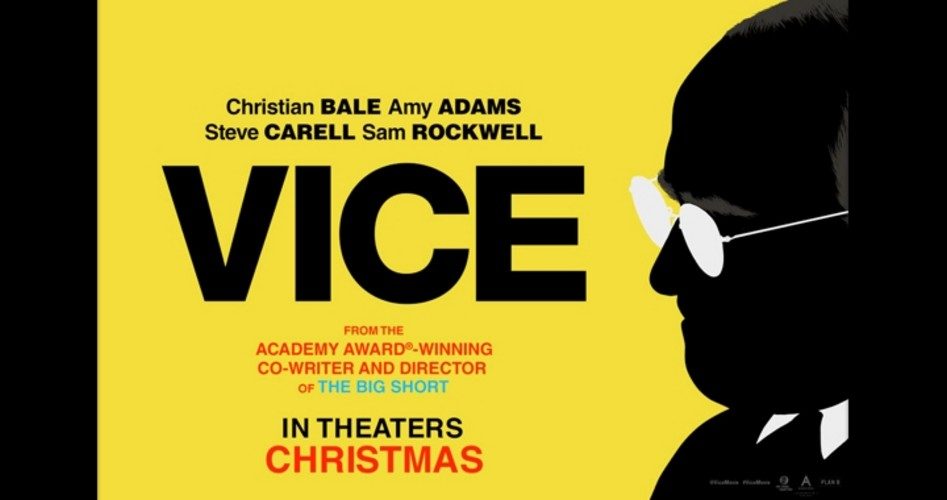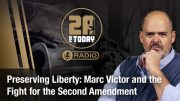
Christian Bale turns in a great performance as Dick Cheney, mimicking the Cheney voice down to the near-hiss, along with emulating his memorable mannerisms, in Adam McKay’s dark comedy Vice. Amy Adams is near-perfect as Cheney’s wife, Lynne, while Steve Carell’s rendition of Secretary of Defense Donald Rumsfeld added greatly to the overall entertainment value of the movie.
It is difficult to find fault with any of the acting performances of the rest of the cast, including Sam Rockwell as George W. Bush.
The movie opens with a 22-year-old Cheney driving erratically and being stopped for drunk driving. Cheney had flunked out of Yale (he eventually graduated from the University of Wyoming) and his fiancée, Lynne, gave him an ultimatum. Either his life changed direction, or she was going to find another man to be her husband. Lynne Cheney is portrayed in the movie almost as a Lady Macbeth, and in fact there is a scene where Dick and Lynne speak to each other in Shakespearean blank verse. It is quite clear that without Lynne, Dick Cheney most likely would have drifted through life, making little impact on American history.
But she wanted her man to be somebody. Cheney was able to get into a congressional intern program, despite having little initial interest in public affairs. I have read Cheney’s autobiography, and it confirms the movie at this point — Cheney had no political philosophy when he took a job with an up-and-coming Illinois congressman, Donald Rumsfeld, a Republican. Cheney is fortunate in that Rumsfeld soon entered the Nixon Administration (he became the youngest secretary of defense in U.S. history; later, he is named to the same position by George W. Bush, and thus is the oldest secretary of defense in American history, as well) and brings Cheney along with him, beginning Cheney’s meteoric rise to chief of staff for Gerald Ford, Wyoming’s lone member of Congress, secretary of defense for George H.W. Bush, CEO of Halliburton, and finally, vice president.
{modulepos inner_text_ad}
In the movie, Cheney is depicted as questioning Nixon’s ability to expand military activities into Cambodia during the Vietnam War, without a congressional declaration of war. Rumsfeld quickly explains to him such restrictions on the president are a thing of the past, and Cheney is never shown worrying much about the Constitution after that.
The movie makes much of the “Unitary Executive Theory,” which the film implies is the belief in an imperial president who can do pretty much as he wishes, especially when it comes to national security. One great flaw of the movie is that it leaves the impression that Antonin Scalia, later a member of the Supreme Court, but then a legal counsel to the president, also favors this view. Actually, Scalia, in his dissent in Morrison v. Olson, took the words of the Constitution seriously — the president holds all the executive authority (and only the executive authority) of the U.S. government. It is a position that was also held by Alexander Hamilton and James Madison. In the Federalist Papers, Madison said, “The great security against a gradual concentration of the several powers in the same department consists in giving to those who administer each department the necessary constitutional means and personal motives to resist encroachments of the others.” That seems to be strong support for a unified executive authority in the hands of the president, meaning his power is not shared with the other two branches, or for that matter, with other members of the executive branch. Scalia’s concern in his dissent was the creation of the office of an independent counsel — he considered it dangerous for the country to have an executive officer unelected and unaccountable to anyone.
The movie seems to lump all non-progressive elements of American society in with Dick Cheney, from the creation of Fox News, to Rush Limbaugh, the Koch brothers, the Heritage Foundation, the Cato Institute, and tax cuts. Efforts to end the Estate Tax, renamed “the death tax” as a result of some smart political marketing, are seen almost as evil. Discussions are made that the tax doesn’t even apply to estates of less than two million dollars. But owners of family farms and family businesses know that, while such enterprises may be “worth” in excess of two million dollars on paper, they do not have liquid assets to pay a death tax. Many are the family farms and family businesses that have been forced into being sold just to pay the death tax. I worked for two years as a membership representative for the National Federation of Independent Business (NFIB), and I personally heard many sad stories from members who were facing the end of the family farm or family business because of the estate tax.
Of course, Cheney is best known for his role as vice president. Texas Governor George W. Bush, facing concerns that he had no foreign policy experience, asked Cheney to be his running mate. Cheney agreed to head up a search for the right person, and finally settled on himself. One of the candidates who was passed over, Oklahoma Governor Frank Keating, quipped that next time he needed to head up the selection process.
As fate would have it, President Bush was in Florida reading to grade school children when the planes crashed into the World Trade Center. Cheney, in the White House at the time, quickly took the reins of power until Bush returned. Cheney is shown as pushing Bush to strike back at Iraq for the 9/11 attacks, despite scant evidence that Hussein had anything at all to do with the attacks. The movie rightly depicts Secretary of State Colin Powell as skeptical about Iraq’s involvement in the attacks, but he makes the infamous speech about WMDs at the UN, anyway. One would think that, if Powell really opposed the Iraq invasion in 2003, he should have resigned rather than give a speech so full of inaccuracies.
At the movie’s end, we see Cheney’s famous interview with ABC News. Cheney is no longer in office, and is asked to reflect on the Iraq War, which had by that time degenerated into battling an ongoing insurgency. When told that polling indicated that “two-thirds of Americans say [the war] is not worth fighting,” Cheney responded, both in the movie and in real life, “So?”
Cheney argued that he was chosen by the American people to keep them safe, and he firmly argued that the terrorists who attacked America on September 11, 2001, needed to be punished to keep it from happening again. What Cheney did not explain was how attacking a country that had no involvement in the 9/11 attacks would accomplish that.
As an aside, viewers should exercise caution when watching dialogue between historical characters in such movies, as it was likely made up by screenwriters. The reason for such caution is that once someone has seen a person “say” something on the big screen, it is very difficult to convince them otherwise that there is no evidence the person actually said it.
A positive aspect of the movie is the fact that those who took us to war in 2003 without good reason are pictured negatively. Unfortunately, as the present situation with Syria indicates, the general public still continues to be quite gullible when accepting propaganda intended to lead them to support the overthrow of foreign governments.



